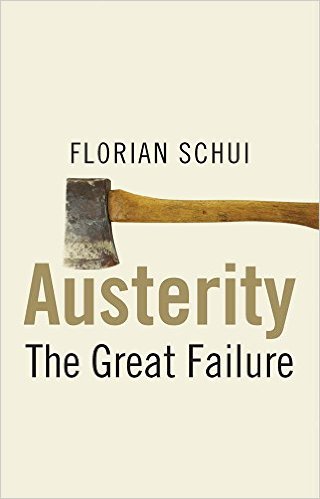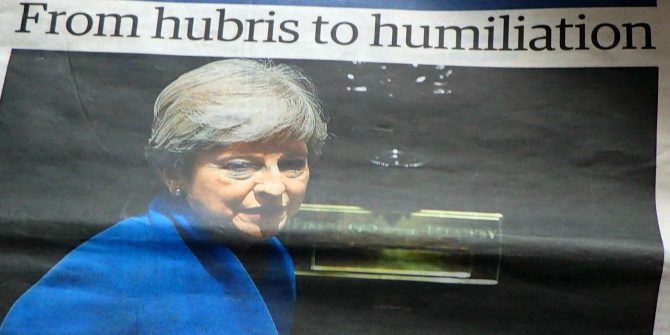Adopting a historical approach, Florian Schui provides an insightful and thought provoking narrative on the concept of austerity, finds Lee Gregory. The text achieves its main aim of introducing the historical roots of austerity, essential to understanding the contemporary context. Schui offers an excellent account of why the idea of austerity has embedded itself in a range of political and economic thinking.
Austerity: The Great Failure. Florian Schui. Yale University Press. 2015.
 At risk of providing a “spoiler”, the final comment in the book is the most suitable starting point for this review:
At risk of providing a “spoiler”, the final comment in the book is the most suitable starting point for this review:
“The conclusion of this survey of the last 2,500 years of debate about abstinence are sobering: there are no convincing economic arguments for austerity policies in their current form and there is no compelling moral or political case for them either. Austerity, in its current form, is simply a great failure.”
Ending the discussion in this way, Schui has set up a standard against which his text can be reviewed: has he provided a convincing argument that there is no compelling economic, political or moral argument for austerity? I am not so sure, but this could depend on what you are looking for from the text.
If you are looking for a text which offers an engaging discussion of the concept of austerity in a wider historical setting, you could find no better text. Schui has carefully selected a number of key thinkers who have informed the debates around austerity and consumption. The opening chapters provide an insightful exploration of the works of Aristotle, Mandeville, Voltarie, Smith and Weber (amongst others) to elucidate how the different schools of thought have shaped the notion of austerity within the public mind. I feel that this is perhaps the subtle discussion with the text: an explanation as to how austerity has gained the status of what Galbraith (1999) would refer to as ‘conventional wisdom’: an idea generally accepted to be true by both experts and the publics.
Schui provides an enjoyable engagement with the debates and ideas, locating them not only in relation to each other but also alongside details regarding the context and social/economic changes happen simultaneously. The earlier chapters demonstrate how the concept of austerity overtly featured in debates and discussions but how this gradually faded into the background – there is less discussion of the term itself in the chapters on Keynes and Hayek. This subtle shift in the narrative potential demonstrates how the concept of austerity had become embedded in economics: critiqued by Keynes whilst supported by Hayek. The inclusion of environmentalist thinking was a welcome addition as the narratives around austerity are rather different to those offered by mainstream political thought. However I felt that insufficient justice was done to these ideas (perhaps because of the focus of the discussion around The Limits to Growth and not some of the more contemporary thinking around “new economics”).
 Image credit: Tighten Your Belt – Austerity by Ken Teegardin (CC BY-SA)
Image credit: Tighten Your Belt – Austerity by Ken Teegardin (CC BY-SA)
That said the text achieves its main aim of introducing the historical roots of austerity which is essential to understanding the contemporary context. But it is the discussion of the contemporary that is potentially a weakness here. If you were looking for a text which examines explicitly the current financial crisis, the narrative of austerity to have gained political credence leading to large scale policy changes, then this is may not be the best text for you. Schui offers an excellent account of why the idea has embedded itself in a range of political and economic thinking. But less clear here are the links to the contemporary situation. How do these notions mix in with contemporary debates where austerity is being used to achieve particular ideological and policy agendas: from reducing state welfare expenditure in Greece and arguments, such as those offered by David Cameron that:
‘We are not doing this because we want to, driven by theory or ideology. We are doing this because we have to, driven by the urgent truth, that unless we do people will suffer and our national interest will suffer. But this government will not cut this deficit in a way that hurts those we most need to help’ – David Cameron (2010) as quoted in Clarke and Newman, “The alchemy of austerity”, Critical Social Policy. 2012.
In fairness the answers are implicitly within the text, but it is up to the reader to draw this out for themselves. Which is slightly odd as the prose is superb at engaging the reader and facilitating their understanding of the historical developments. However, instead of explicit this discussion, Schui offers a conclusion which considers what the foregoing arguments offer in terms of thinking forward and moving beyond the concept of austerity. This is an interesting and thought provoking approach (and it would have been great to see more discussion on this issue). It illustrates debates about the “good society” and individual liberty and need to reflect on notions of leisure and work in society and our day-to-day activities. Yet I felt there was a need for a more explicit account of the current challenges around achieving alternatives to accompany this.
Overall the text does demonstrate the key claims of a number of ideas as well as some of the critiques and limitations to be found with each. So yes, the text does illustrate that there is no convincing account for austerity. Yet the idea remains so powerful and deeply embedded in political and economic thinking this perhaps misses the key point of ideological debate: the belief in the need for austerity for different reasons (be it reducing state planning over the market or protecting the natural environment) is not a value neutral discussion. It is established upon deep-seated ideas about the nature of society, the economy and human nature and here evidence isn’t the arbiter of success. Rather it is having the convincing argument. And as Schui demonstrates, austerity, in a number of guises, has gained status as a morally worthy pursuit; any challenge to this will be hard pressed to succeed (at least in the short-term).
Adopting a historical approach, Schui provides an insightful and thought provoking narrative. One benefit of this is that the text will be accessible to a wide number of readers, not just academics but also the wider public (my plumber expressed an interest in the text after seeing it on my coffee table, he was at that point reading the Ragged Trouser Philanthropist). It is rare to find a text which covers historical philosophical and economic debate in a way which can be accessed by anyone and encourage within them a more critical approach to the conventional wisdom of austerity: this is something to be commended and emulated by other authors.
Lee Gregory is a lecturer in Social Policy at the University of Birmingham. His research interests include poverty, public health and alternative forms of welfare provision. Read more reviews by Lee.






